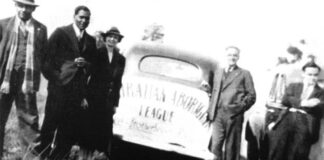The Aboriginal Medical Service Western Sydney (AMSWS) is fighting closure due to government funding cuts. Chairperson Brad Delaney spoke at the rally against Aboriginal community closures in Sydney in June.
“Our service has been in operation for almost 30 years”, he told the protest. “The AMS as far as episodes of care goes is the largest Aboriginal medical service in the country, with over 11,000 active patient files.”
“We’re being shut down, our funding has been cut, because of the little bit of trouble that we’re in.”
The government points to the service’s debts of around $4 million to justify its closure. But AMSWS says its problems began when the government reneged on a promise to refund $500,000 spent on capital works. It has also faced increasing costs from community demand for services.
As Brad explained, “They wouldn’t allow us to negotiate to try and trade out [of this]. We’ve had three forensic audits done over the last six years, they tried and they tried to find evidence of misappropriation but there was no evidence.
“The services we provide go above and beyond what we get funded for. The people that work in the place all take that little bit of extra effort to make sure Aboriginal people in our community are looked after.
The AMSWS provides not only GP services but also specialist services like mental health and support when family members pass away.
It has built up specialist knowledge of medical problems faced by the local Aboriginal community like diabetes that will be lost if the service closes.
“I’m proud to say that over the last couple of years we have seen an increase in he number of Aboriginal elders in our community. There are now almost 100 elders, and I think that can be put down to the service they receive from the AMS,” said Brad.
Patients will be transitioned to a new medical service which does not yet exist. But as Brad said, “We don’t know who this new service is, it could be a non-Aboriginal organisation that’s got no idea about Aboriginal community control.
“Our organisation is based on Aboriginal people meeting to discuss how the service needs to be run, and to look for Aboriginal people who can provide the services.”
“They’ve thrown us a three month lifeline until 30 September which gives us time to get the word out there that this is happening. If they’re starting to do this to big organisations like ours and the communities in Western Australia they can do it to anyone. We need to stand up and we need to fight.”





